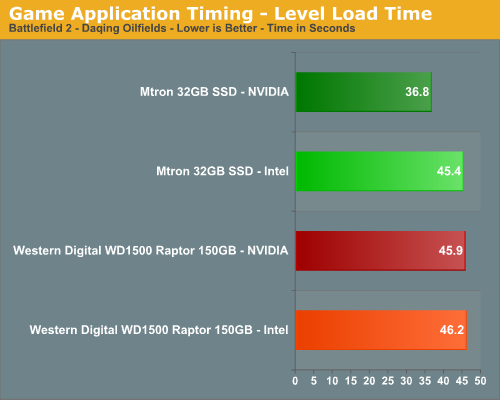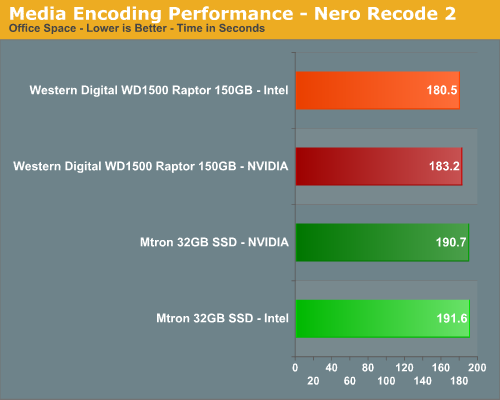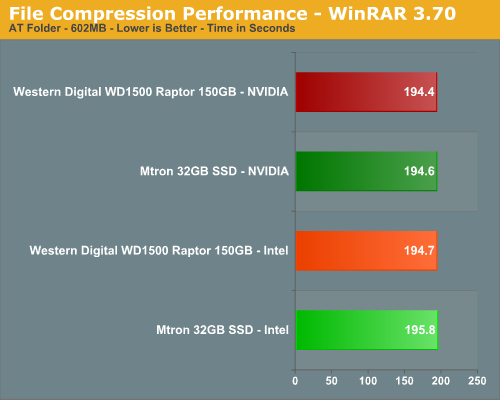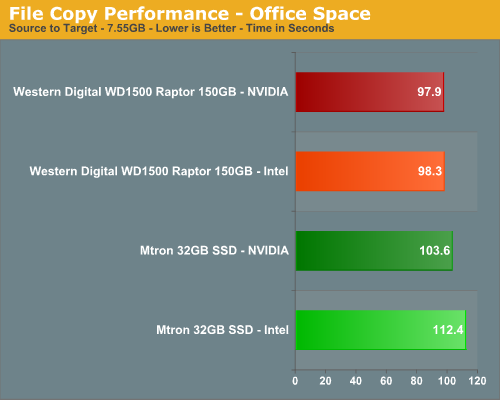MTRON SSD 32GB: Wile E. Coyote or Road Runner?
by Gary Key on August 15, 2007 3:00 AM EST- Posted in
- Storage
Actual Application Performance
Our application benchmarks are designed to show application performance results with times being reported in seconds, with lower scores being better. While these tests will show differences between the drives it is important to understand we are no longer measuring the synthetic performance of the hard drive but how well our test platforms perform with each individual drive. The performance of a drive is an integral part of the computer platform but other factors such as memory, CPU, core logic, and even driver choice can play a major role in determining how well the drive performs in any given task.
Game Level Load
This test centers on the actual loading of a playable level within our game selection. It is obvious based on the drive's specifications that this drive could be used in a gaming system, though its capacity severely limits the amount of newer multi-Gigabyte titles you can load on it. We have found in gaming that the burst/sustained read speed and access time of a drive is very important. Considering SSDs excel in low access (latency) times we thought it would be interesting to see how well this drive performs in one of our more demanding game tests. The Battlefield 2 test measures the time it takes to load the Daqing Oilfields level. Our application timer begins when the start single player icon is initiated and ends when the join game icon is visible.

This is one of the more demanding game level load times we test currently and the MTRON drive scores first, although the margin is minimal with the Intel chipset. Our NVIDIA based board loads this particular level 8.6 seconds faster than the Intel board, resulting in a 20% improvement over the Raptor. After several hours of game play we could definitely tell a difference between the two drives in this test. The MTRON SSD product always seems to load the levels in a smoother manner than our Raptor although it is difficult to determine any actual speed differences except when first starting the game. The lack of hard drive noise is a welcome relief when playing games with the MTRON drive.
Nero Recode
Our encoding test is quite easy - we take our original Office Space DVD and use AnyDVD Ripper to copy the full DVD to the hard drive without compression, thus providing an almost exact duplicate of the DVD. We then fire up Nero Recode 2, select our Office Space copy on the hard drive, and perform a shrink operation to allow the entire movie along with extras to fit on a single 4.5GB DVD disc. We leave all options on their defaults except we turn off the advanced analysis option. The scores reported include the full encoding process and are represented in seconds, with lower numbers indicating better performance.

This test is primarily dependent on CPU performance but the write performance of a drive can make small but measurable differences in completion times. As in our PCMark05 tests, the write performance of the MTRON drive does not match that of our Raptor and the resulting performance is about 6% slower than the Raptor. We typically find in this particular test that the CPU throughput of the Intel chipsets is a little better than the NVIDIA chipsets and our Raptor results bear this out. However, due to the better write speed performance of the NVIDIA chipset with the MTRON drive, we see it scoring ahead of the Intel solution even with the CPU throughput disadvantage.
WinRAR 3.70
Our WinRAR test measures the time it takes to compress our test folder that contains 444 files, 10 folders, and 602MB of data. While the benchmark is CPU intensive for the compression tests it still requires a fast storage system to keep pace with the CPU. A drive that offers excellent write performance can make a slight difference in this benchmark.

This test relies on the CPU and also the burst rates of the storage system. Even handicapped with a 36% lower burst speed and 6% lower write speeds, the MTRON drive is basically even with the Raptor. The difference between the NVIDIA and Intel chipsets with the MTRON drive is only 1% in this test. In other words, WinRAR file compression - even with a fast CPU - is so limited by CPU and memory performance that hard drive speed rarely comes into play.
File Copy Performance
Our file copy test measures the time it takes to transfer our test folder that contains 29 files, 1 folder, and has 7.55GB of data from our source drive to the target test drive. This benchmark is disk write intensive and requires a fast storage system.

We finish our application tests with a benchmark that favors the Raptor drive because it represents a pure write scenario. As in PCMark05 where the largest differences in scores were generated with the write tests, we see the SSD product being up to 13% slower. However, that margin is only 6% when comparing the results with the NVIDIA chipsets as the MTRON drive is almost 8% slower on the Intel chipset.
Our application benchmarks are designed to show application performance results with times being reported in seconds, with lower scores being better. While these tests will show differences between the drives it is important to understand we are no longer measuring the synthetic performance of the hard drive but how well our test platforms perform with each individual drive. The performance of a drive is an integral part of the computer platform but other factors such as memory, CPU, core logic, and even driver choice can play a major role in determining how well the drive performs in any given task.
Game Level Load
This test centers on the actual loading of a playable level within our game selection. It is obvious based on the drive's specifications that this drive could be used in a gaming system, though its capacity severely limits the amount of newer multi-Gigabyte titles you can load on it. We have found in gaming that the burst/sustained read speed and access time of a drive is very important. Considering SSDs excel in low access (latency) times we thought it would be interesting to see how well this drive performs in one of our more demanding game tests. The Battlefield 2 test measures the time it takes to load the Daqing Oilfields level. Our application timer begins when the start single player icon is initiated and ends when the join game icon is visible.

This is one of the more demanding game level load times we test currently and the MTRON drive scores first, although the margin is minimal with the Intel chipset. Our NVIDIA based board loads this particular level 8.6 seconds faster than the Intel board, resulting in a 20% improvement over the Raptor. After several hours of game play we could definitely tell a difference between the two drives in this test. The MTRON SSD product always seems to load the levels in a smoother manner than our Raptor although it is difficult to determine any actual speed differences except when first starting the game. The lack of hard drive noise is a welcome relief when playing games with the MTRON drive.
Nero Recode
Our encoding test is quite easy - we take our original Office Space DVD and use AnyDVD Ripper to copy the full DVD to the hard drive without compression, thus providing an almost exact duplicate of the DVD. We then fire up Nero Recode 2, select our Office Space copy on the hard drive, and perform a shrink operation to allow the entire movie along with extras to fit on a single 4.5GB DVD disc. We leave all options on their defaults except we turn off the advanced analysis option. The scores reported include the full encoding process and are represented in seconds, with lower numbers indicating better performance.

This test is primarily dependent on CPU performance but the write performance of a drive can make small but measurable differences in completion times. As in our PCMark05 tests, the write performance of the MTRON drive does not match that of our Raptor and the resulting performance is about 6% slower than the Raptor. We typically find in this particular test that the CPU throughput of the Intel chipsets is a little better than the NVIDIA chipsets and our Raptor results bear this out. However, due to the better write speed performance of the NVIDIA chipset with the MTRON drive, we see it scoring ahead of the Intel solution even with the CPU throughput disadvantage.
WinRAR 3.70
Our WinRAR test measures the time it takes to compress our test folder that contains 444 files, 10 folders, and 602MB of data. While the benchmark is CPU intensive for the compression tests it still requires a fast storage system to keep pace with the CPU. A drive that offers excellent write performance can make a slight difference in this benchmark.

This test relies on the CPU and also the burst rates of the storage system. Even handicapped with a 36% lower burst speed and 6% lower write speeds, the MTRON drive is basically even with the Raptor. The difference between the NVIDIA and Intel chipsets with the MTRON drive is only 1% in this test. In other words, WinRAR file compression - even with a fast CPU - is so limited by CPU and memory performance that hard drive speed rarely comes into play.
File Copy Performance
Our file copy test measures the time it takes to transfer our test folder that contains 29 files, 1 folder, and has 7.55GB of data from our source drive to the target test drive. This benchmark is disk write intensive and requires a fast storage system.

We finish our application tests with a benchmark that favors the Raptor drive because it represents a pure write scenario. As in PCMark05 where the largest differences in scores were generated with the write tests, we see the SSD product being up to 13% slower. However, that margin is only 6% when comparing the results with the NVIDIA chipsets as the MTRON drive is almost 8% slower on the Intel chipset.










37 Comments
View All Comments
iwodo - Wednesday, August 15, 2007 - link
With 40% price decrease per year as well as improve in transfer speed. It will only take 2-3 years before the drive become affordable.But i keep on wondering. Let say I need 10GB for OS. 10GB for Application. I still have 12GB for Swap Space and other uses. 32GB for basic usage is actually more then enough if we dont store any Music or Video.
Personally i would like to see Normal Hard Drive gets much bigger Capacity ( 2 - 4 TB Per Hard Drive ) and move them out of the Main Box to external storage via eSATA. While the Main performance Hard drive will be a SSD based Hard Drive.
wordsworm - Wednesday, August 15, 2007 - link
Boo!johnsonx - Wednesday, August 15, 2007 - link
it's a hard drive test, what difference does it make what CPU brand they use?wordsworm - Thursday, August 16, 2007 - link
Did you read the article? It mentioned how much faster it works on the Nvidia chipset than the Intel chipset. What about an AMD chipset? What difference would that make? You don't think this would make a difference after reading the article?shabby - Saturday, August 18, 2007 - link
You're right, with the amd chipset it would probably be 50% slower... good thing anandtech didnt waste their time testing on amd ;)Bladen - Wednesday, August 15, 2007 - link
Has any reputable site ever done RAID 0 tests with a pair (or more) of SSD's?AnnihilatorX - Wednesday, August 15, 2007 - link
Well http://www.tomshardware.com/2007/08/13/flash_based...">Toms Hardware had done a review including RAID 0 on SanDisk's 32GB SSDjohnsonx - Wednesday, August 15, 2007 - link
yes, but he asked for a reputable sitejohnsonx - Wednesday, August 15, 2007 - link
bad johnsonx, bad!Axbattler - Wednesday, August 15, 2007 - link
I agree that it will remain a niche market product, but I reckon that the main reason will be cost per GB. I wonder if the average consumer's space requirement has exploded much past the requirement added by Vista: how many really rip audio/video to their HD?
Granted, I am a space hog, and I happen to rip at least my CDs to lossless - but I do not know many (outside enthusiast forums) who do that. From a performance enthusiast point of view, especially those who will afford the 'best', I reckon that SSD may overtake the Raptor as the choice for OS drive within the next three years. Those users could always grab one or more TB size HD for their multimedia needs. From a silent PC enthusiast point of view, going by this review, SSD is a non brainer - the more dedicated silencers are already using 2.5" drive in their desktop.